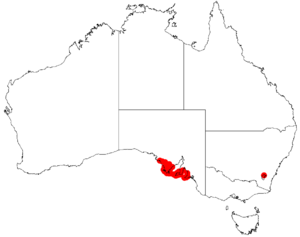Coast wallowa facts for kids
Quick facts for kids Coast wallowa |
|
|---|---|
| Scientific classification | |
| Genus: |
Acacia
|
| Species: |
nematophylla
|
 |
|
| Occurrence data from AVH | |
The coast wallowa (scientific name: Acacia nematophylla) is a type of shrub. It belongs to the Acacia family, which is a large group of plants. This plant is special because it is found only in southern Australia.
What Does the Coast Wallowa Look Like?
This shrub usually grows to about 2.5 meters (about 8 feet) tall. It has a bushy shape, meaning it's full and dense. Its branches are smooth and have angles at their tips.
The coast wallowa has unique leaf-like parts called phyllodes. These phyllodes are flat, narrow, and look like thin lines. They are grey-green and can be straight or slightly curved. Each phyllode is about 2 to 4 centimeters long and very thin, only about 0.7 to 1.5 millimeters wide.
This plant flowers almost all year, except for June. It blooms the most between November and February. Its flowers grow in small, round clusters, like little balls. Each cluster has 28 to 41 bright yellow flowers.
After the flowers, the plant grows long, brown seed pods. These pods are a bit woody and can be up to 11 centimeters long and 5 to 6 millimeters wide. Inside the pods, you'll find dark brown to black seeds. These seeds are shiny and about 4 to 5 millimeters long.
How Did It Get Its Name?
The coast wallowa was first officially described in 1855 by a botanist named George Bentham. He wrote about it in a science journal.
The plant's scientific name, nematophylla, tells us something about it. It comes from two Greek words: nemato, which means thread-like, and phyllon, which means leaf. This name perfectly describes the plant's very thin, thread-like phyllodes!
Where Does the Coast Wallowa Grow?
This plant is native to certain parts of South Australia. You can find it growing among sand dunes in sandy soils. It lives in areas like the Eyre Peninsula, the southern Yorke Peninsula, and the Fleurieu Peninsula.

